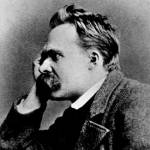 This week in Contemporary European Philosophy we finished our discussion of Friedrich Nietzsche’s 1887 Genealogy of Morals, which is an essentialized and more systematic presentation of themes from his 1886 Beyond Good and Evil.
This week in Contemporary European Philosophy we finished our discussion of Friedrich Nietzsche’s 1887 Genealogy of Morals, which is an essentialized and more systematic presentation of themes from his 1886 Beyond Good and Evil.
Here is my digest of the main line of argument of Genealogy‘s first essay:
1. Evolution and psycho-biology: Humans are an evolved bundle of inbuilt drives that assert themselves.
2. The most basic drive is the will to power.
3. Humans divide into two basic types: those whose drives are strong, and those whose are weak.
4. Humans also divide into those who drives are focused, and those whose drives are diffuse.
5. The strong/focused types exhibit master psychology. The weak/diffuse type exhibit slave psychology.
 6. Masters are energetic, adventurous, fearless, delight in self-expression, etc.
6. Masters are energetic, adventurous, fearless, delight in self-expression, etc.
7. Slaves are passive, fearful, envious, etc.
8. Moral codes are conscious formulations of one’s needs and interests.
9. So one’s morality is an expression of one’s psycho-biological type.
10. So there are two basic types of morality.
11. Master morality affirms pride, ambition, independence, assertiveness, danger.
12. Slave morality affirms dependence, safety, passivity, humility.
13. Life is essentially conflict and expropriation.
14. Masters are confident in the face of conflict, so the master morality embraces using others for one’s own ends.
15. The slave morality is fearful of conflict and expropriation, so it condemns them.
16. The battle between the master and slave moral codes is of long genealogy.
 17. Historically, the master morality dominated first.
17. Historically, the master morality dominated first.
18. But the master morality declined and slave morality ascended.
19. Currently the slave morality is winning.
20. The major symptoms of this are the cultural dominance of socialists, democrats, Judeo-Christian priests, egalitarians, and the like.
21. The slave morality’s dominance is a threat to the advancement of man.
22. So master morality or a new form of it must be rejuvenated.
Related:
Journal article: “Egoism in Nietzsche and Rand” [pdf] and Professor Lester Hunt’s rejoinder [pdf].
Book: Nietzsche and the Nazis.
Blog post: Nietzsche as public choice theorist.
Can this explain some of the political variation we display in the United States? I have thought for a while that there is a genetic component to individual political preferences. Our two party system almost forces one into either the left-liberal camp or the right-conservative camp and we see that division is almost equal now. In The Blank Slate, Pinker describes these preferences, which seem to cluster, as the Utopian Vision and the Tragic Vision. For most of the 20th century, those of the Utopian persuasion had the upper hand, but in the last few decades, with breakthroughs in brain science, the advantage is shifting, at least in terms of rationale.
My next area of inquiry would address whether there is some difference in the evolved genetics on the North American continent from the rest of the globe that makes us view these things differently or is the difference merely cultural?
A few rambling thoughts: I think this is all a false dichotomy, and capitalism is the system that resolves it.
Economically every working person is “master” and “slave”: he or she serves and is served e.g. a cabbie is served breakfast at a grill counter; later in his shift he serves the waitress by driving her home. Even the most old school corporate tyrant will tremble on being told his customers are unhappy for they are his “masters.”
Weakness and strength, success and failure, victory and defeat in varying ratios are part of EVERY life, though Nietzsche was right to point out that its obsession with the weak too often caused Christians to resent the strong.
Alexis De Tocqueville noted the misfortune that struck one member of a rural American community was felt by all, and all rallied to help. He noted the self-interest in this, but said it appeared to breed a genuine empathy for others.
In contrast to the welfare state that subsidizes failure, help in a free society tends to be more economically and morally uplifting and attempts to integrate into society.
Saw a wonderful TV spot with sports star and entrepreneur “Magic Johnson.” He brought businesses such as multiplex movie theaters and Starbucks coffee shops to the ghetto, hiring only local help. At theaters gang colors are forbidden, “not to disrespect,” he says in a filmed prologue before the movie, “but so everyone can enjoy the show.” Incidents of vandalism at these locations have been almost non-existent. He gave ghetto residents not pity and alms, but respect and jobs. By implication he said to them, “you can.” Pursuing his self interest he raised up the residents better than any bleeding heart with arteries pulsing with the milk of human kindness who would have preferred to cut them welfare checks.
A central issue Nietzsche neglects is production, the process that creates the goods to be expropriated. Much of his rhetoric supports an Attila-like character. But of course Attila’s is far from the greatest strength. Visualize the spectacle of he and his hordes of marauding Huns confronting a modern American scientist with an H-bomb.
Mises noted that a number of German thinkers who expounded this militarist armchair machismo were sickly individuals who would unlikely have survived long in the conditions they advocated.
Edward: What exactly is it that you think is a false dichotomy? Many people, including the influential behaviorists in the 20th century, believe a person’s personality traits and personal behaviors and preferences are shaped primarily by his/her environment, and, in the extreme, totally by that environment. Point 3 in the above list seems to assert that the 2 basic types of people are innately determined.
I’m a fellow close to the end of my time in this world, but my quest to understand never weakens and I think it important for our survival to learn how to live in and govern a society in a way that moves it forward rather than destroys it.
Anecdotally, in my household, I’m a right libertarian (mostly) from the southern United States of Scots-Irish extraction (mostly) and my spouse is a Latin-American reared in a Catholic dominated environment who emigrated to the US as an adult and exhibits what I would call strong traditional Western values including what is frequently referred to as a Protestant work ethic. She and I are at odds when it comes to party politics. It is not so much that we have disagreements regarding outcomes we would like to see, but when it comes to methods and approaches, fail. My take is that she operates largely from ‘feelings’ while I try to be more analytical. It reminds me of many details described by Schlesinger’s Politics of Upheaval from the 1930’s depression recovery efforts. That when everyone seemed to be described as either supportive of the Fascist Capitalists, on the one hand, or the Socialists and Communists on the other.
In any event, it will be great if we can actually figure out how people get to think, feel, and act the way they do. I see a lot of depth of knowledge in your comments and only seek to understand better.
Robert: I see the master versus slave morality as the false dichotomy, the ‘all’ referring to the different aspects and implications of it. Both as defined by Nietzsche create sorry individuals and societies. Alexis De Tocqueville’s analysis of slavery in ‘Democracy in America’ is masterful. Moral and humanitarian considerations aside he shows the utter economic inefficiency of slave-owning societies, contrasting for example stagnant slave-owning Kentucky with vibrant Ohio across the river. The South was an entire society where work was regard as dishonorable. Imagine!
I think there’s a ‘will to power’ and reason is the means to answering it. Power means many things, healthy and pathological, from life-enabling skills (a child learning to walk) to legal enfranchisement (women’s suffrage) to oppressive political authority (Stalin’s Terror). I think the most fundamental, far reaching and long term social motivation is the ‘will to the power’ to live as humans qua humans – to answer those needs, desires, and aspirations shared by people in every society i.e. to support one’s life, values, dignity, self-actualization and fulfillment with everything they require and imply.
The values articulated by Nietzsche would keep man at a primitive level of development. A thug may be brave but a society predicated on thuggery is not conducive to intellectual, scientific and technological progress.
Re: genetically determined ideas. Read of a baby girl abandoned by “head-hunters” in Papua New Guinea a century ago picked up by Christian missionaries. They raised her as their own. As a young woman she obtained a Ph.D. in anthropology. As far as I know she never exhibited an inclination to remove and shrink people’s heads or dine on their flesh. We are born with an amazing cognitive apparatus, but not its content.
I like German-American anthropologist Franz Boas who did much to discredit the sinister eugenics movement and racial theories in general by demonstrating the far greater importance of culture in social and psychological development. Offered sage advice to Negroes on improving their situation.
Uh, oh – just heard a creak in my soapbox…
A memory jogged loose: from Margaret McMillian’s ‘Paris 1919’ about the six month peace conference that followed WW I. Australian Prime Minister Billy Hughs wanted all or part of Papua New Guinea, still home to headhunters and cannibals. Missionaries enquired about access for their work. “Absolutely,” replied Hughs, “why there’s days the poor devils can’t find half the missionaries they need to survive.”
Patrice Lamumba, late of the Congo, replied similarly to the Russians, “Send more diplomats. The last one were DELICIOUS!”
Edward: I took the references to master morality and slave morality in the list of points to be descriptive of how the use of power, or not, could be explained by personality types. I did not view this as referencing politically and physically enforced slavery of a group based on physical attributes. In our own society, many individuals view government encroachments into aspects of their lives through law, regulation, and taxation, among other things, as a form of enslavement.
So the degrees of freedom or enslavement we experience in our own society might be viewed as a barometer of which of these suggested moralities has the edge at the moment.
It also seems as if the political leaders are largely of the master morality, regardless of the political form of the society they lead, since they have the traits that enable that role. This frequently leads ultimately to disillusionment of the people with the leaders they have endorsed, since most of what they heard and believed from these leaders was false anyway.
Actually the Nazis I believe used Nietzsche’s rhetoric to justify literal slavery and many other actions including extermination of physically and mentally incapacitated. (Haven’t yet read Professor Hicks’ book on the subject).
Mr. Dahl: copy that re delish! That was funny (except to the Russian diplomatic corps). Heard it somewhere before. Have to look it up.
I think Rand made an excellent observation that the master-slave morality is unwholesome for both parties, that the master becomes entrapped in a kind of slavery himself and that the nexus dehumanizes both.
This whole thing sounds like a rebranding of the 4 humors theory “hot/cold & dry/wet”. It strikes me a little bit like a quack theory.